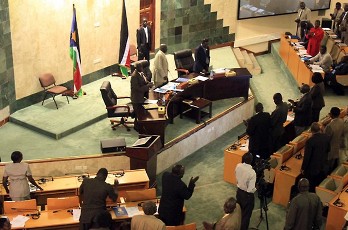South Sudan parliament hints rejecting peace agreement over sovereignty
September 8, 2015 (JUBA) – South Sudanese parliament warned on Tuesday it would reject the deal if it will be found to have infringed on national sovereignty when it is tabled before the legislators, sparking concerns of delays or backtracking by the national legislature after the executive council of ministers approved the deal and said it would be presented to the house for ratification this week.

South Sudanese rebels said they will ratify it by Thursday so that the next step of implementing the security arrangements would start in a workshop to be organized by IGAD in the Ethiopian capital, Addis Ababa, where senior military officers from the two warring parties will participate in.
Speaker of the national legislative assembly in Juba, Magok Rundial, told Sudan Tribune on Tuesday that peace and reconciliation has been placed as the top agenda of all activities of public institutions in the country but warned that the peace deal could be rejected by the parliament if found to have infringed on the national sovereignty.
“The parliament can reject it if it infringes [on] sovereignty, why not. The sovereignty is not about individuals. It is about the country and it cannot be compromised whatever differences and it is the responsibility to every citizen to protect it,” warned Rundial before pointing out “unity of the people and the country was paramount.’
The top legislator, who will lose his position in December according to the peace agreement, however said he hoped ratification of the deal would allow the rival forces to cease fighting in violation of the permanent ceasefire declared by the rival leaders after appending their signatures.
“We know this peace has been imposed which means there is something behind it. We can reject it but still those who will suffer will be our people who have always paid the price of political differences over issues they do not know,” said parliament speaker Rundial, stressing that president Kiir and the government cared much about the lives and the suffering of the citizens and so wanted to put an end to the conflict.
President Kiir and the government, he said, want this conflict to stop and the leadership of the assembly stands ready to mobilise the members to go back to their constituencies immediately after the agreement is ratified to sensitise and educate the people and the state governments as well as local people in their different capacities, whether as community leaders, youth, women to support the implementation of the agreement.
Rundial explained that the assembly was waiting for day when the deal would be presented to the house by a representative of the executive organ of the government. He blamed the executive for the delay in tabling the peace agreement before the parliament.
“The members are waiting for the day when it will be tabled. We are told it will be tabled soon, may be this week or next week. There is no fixed date. May be this is because the concerned institutions are preparing to present it,” he said.
“We don’t know the date yet but what we know is that it will be tabled because this is a requirement in the agreement. Once it is tabled, it will follow normal parliamentary procedures. The members will be divided into groups of specialised committees to study the agreement chapter by chapter and word by word in order to understand every single word and context before they can come up with the final resolution on the adoption of the agreement,” Rundial further explained to Sudan Tribune.
Analysts however predict that the parliament will have no other option but to ratify the peace agreement, owing it to the same heavy international pressures which made it possible for president Kiir to sign it on 26 August in order to avoid tough measures on the young nation.
They say the contradicting signals on whether to ratify it or not could only be meant to temporarily try to appease voices in rejection of the peace deal as the government is divided with some senior political and military officials opposed to the agreement.
(ST)
